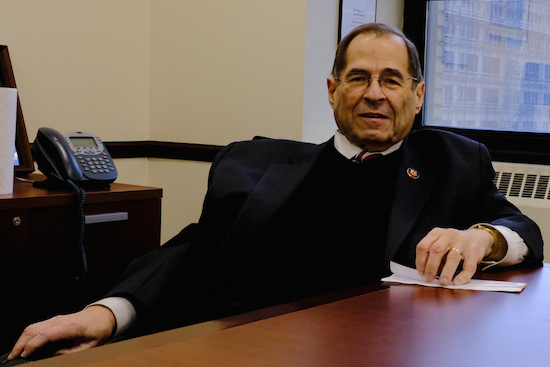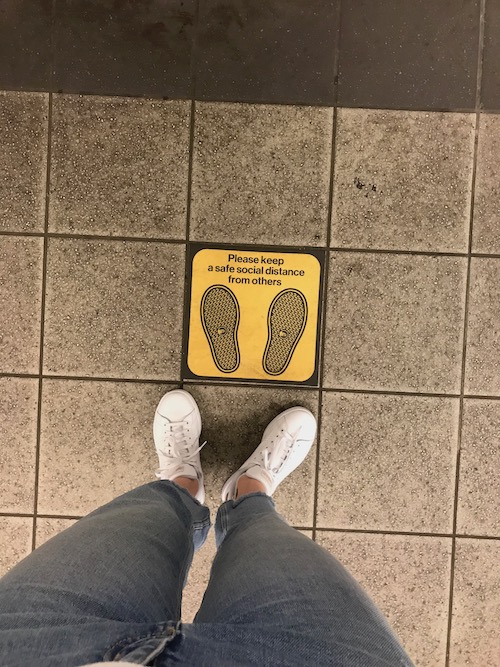By Michael McDowell
Primary Day is June 23rd, and incumbent Congressman Jerry Nadler faces two challengers: Lindsey Boylan and Jonathan Herzog. It’s a rare challenge for Nadler, who has been in Congress since 1992. The Rag spoke with each of the candidates. A televised debate between the candidates is scheduled for June 17th on NY1.
The following conversation with Rep. Nadler, part two of two, has been condensed and edited. Read the first part here.
West Side Rag: This city and state have had more deaths from Covid-19 than anywhere else in the country. Would you support an investigation into why the pandemic had such a devastating impact here?
Jerry Nadler: I would certainly support the committees of proper jurisdiction investigating all of this. We have to, in any event, because when anything like this happens, you have to do what the military calls an ‘After Action Report’—we’re still in the middle of the action, but it’s the same thing—to figure out why it happened, what could have been done to alleviate its seriousness to make it less catastrophic, and what we can learn for next time, because there will be a next time.
We know that given climate change, and given human encroachment on our natural habitat, we’re going to get a lot more viruses that we haven’t seen before. This is going to happen again, and one question is, how do we make sure that the next time it happens, we’re prepared for it, and we don’t get this kind of catastrophe.
WSR: When do you think we’ll see some return to normalcy?
JN: Well, a lot depends on the progress of the disease. Do we get a vaccine? We will get a vaccine, probably, but how fast? We don’t know. Treatments? How fast, we don’t know.
The neighborhood will return toward normal as we get on top of the transmissions of the disease, as we flatten the curve. Then, they’ll start opening businesses again. At some point, people will be able to go to restaurants and sit outdoors. Eventually, we’ll get more toward normal.
But there are going to be permanent effects, and it’s very difficult to say what those effects will be. A lot of people are now working from home. When the restrictions are over and people can go back to their offices, a lot of companies may decide that having 40 percent of my people work from home is okay.
That would have implications for occupancy rates in office buildings, which is a large part of the economy in New York, and Manhattan especially, if you have suddenly the need for many fewer offices. It would also have real implications for childcare, and for transportation. You would need fewer cars, and maybe less mass transit, depending on the percentage. We don’t know yet.
I don’t think it’s really predictable. We haven’t had a shock like this in a century, since the plague of 1918. It’s going to leave real changes.
WSR: One thing people are already seeing, and should probably anticipate more of, are empty storefronts. This has been a major issue already in the district. What will you do to protect small local businesses?
JN: Small businesses that occupy small storefronts, retail businesses for example, have been clobbered by this—for obvious reasons.
Who has therefore gotten a much larger share of the market? Amazon, and very large businesses, because they can centralize, and they’ve been able to do so.
When we come out of this, the economy is probably going to be even more centralized, and wealth is going to be even more concentrated in fewer hands and in fewer big businesses, as opposed to small businesses and other people.
In the Judiciary Committee, we’re starting the first serious antitrust hearings since the 1960s. I think the economy is much too concentrated, and wealth and power are held in too few hands, which is also dangerous to democracy.
The pandemic effect will make that worse. So we’re going to have to deal with that, and more vacant storefronts are one aspect of that.
WSR: How about conditions at the New York City Housing Authority (NYCHA)? How are you pushing to improve conditions at NYCHA in Congress?
JN: Well I’ve been working on that, especially with Nydia Velazquez, for years. Almost every year Nydia and I have managed to pass an amendment increasing funding for public housing generally, and for Section 8 and NYCHA specifically.
Now, it hasn’t been nearly enough. The two of us introduced legislation a few months ago to appropriate $72 billion, of which New York would get, I think, $32 billion, for NYCHA, because that’s the capital backlog they have. Nydia and I have taken the lead in Congress for years on this.
WSR: Wise Towers on the Upper West Side, a NYCHA development, is currently undergoing PACT conversion. Are you monitoring PACT and RAD conversions in the district [PACT and RAD are programs that transfer management of NYCHA apartments to private entities]?
JN: Yes, we are monitoring RAD conversions. Fulton Houses and Elliott Houses in Chelsea are being considered for that. I don’t like that, because the rights of the tenants, once they’re converted, although we’re told that they’re the same, they’re not really the same. And so I oppose that.
The city’s reason for supporting the RAD changeover is that under certain tax laws, they could access certain federal tax benefits that they couldn’t if they remained under the public housing law. We’re looking into legislation to change that, so that there’s no financial benefits at all for RAD conversion.
RAD conversion has disadvantages for tenants, but the city argues that it has to do it to get more money for NYCHA, and we’re looking at legislation to change that so that there’s no advantage to it for the city financially.
WSR: You’ve said that “abolishing ICE largely misses the point.” Critics say the Immigration and Customs Enforcement (ICE) has repeatedly violated civil liberties and due process, and call it a rogue agency.
JN: It is a rogue agency, and I said abolishing it misses the point because all you would do is change the initials and have some other agency.
As long as you have an immigration law, someone has to enforce it. First of all, you have to change the law so that it’s fair and not brutal, and that’s what I’ve been fighting for in the Judiciary Committee for a long time. That’s why I was one of the few people who opposed the last major change in the immigration law in the 1990s. It murdered due process, and it justified a lot of terrible things that ICE is doing today. So you’ve got to change the law, and then you’ve got to rein in the agency.
WSR: One of your opponents, Lindsey Boylan, has made mental health care a major piece of her campaign. Do you have plans to address mental health?
JN: Well, I supported legislation, it’s called Mental Health Parity, to put mental health on the same level as physical health for funding for Medicare and Medicaid and all federal funds. That’s the most important thing.
Medicare, Medicaid, and for that matter, private insurance, all provide for different levels of reimbursement, and generally if you have a physical ailment, the insurance will pay a certain amount.
But if you have a mental health issue, for which you need counseling, or other mental health treatment, it generally isn’t funded the same way. So we are having a struggle in Congress, to [force] insurance companies—private insurance companies, Medicare, and Medicaid—to pay for mental health treatment exactly the same way that they would pay for physical treatments. We’ve been fighting this battle for at least six or seven years.
WSR: We’ve heard a lot of talk about Medicare for All. I personally am uninsured, and utilize some of the free health services that are available in New York City. Medicare for All may be quite ambitious, but do you see a path forward to primary care for all and would you support such legislation?
JN: Well, I support Medicare for All, and I’ve supported that ever since I’ve been in Congress. It’s been a long-term struggle, and I’m still supporting it. I’m one of the primary sponsors of the Medicare for All bill.
Not just primary care, or medical care—mental health care should be paid for, too. There should be no co-pays. The government should pay all health care costs, and that’s what I’ve been fighting for, for a long time.
WSR: Do you foresee consent decrees once again being utilized by the Justice Department? It’s been, I think, probably 35 years since Handschu in New York.
JN: Consent decrees and pattern and practice investigations have been greatly reduced under the Trump Justice Department. A new Justice Department, under Biden, would certainly turn that around, but that’s just a small part of it.
We’re going to be much more comprehensive, and you’ll see that in the next week or so.
WSR: Thank you.
…And here’s one more question we didn’t get to in the interview. In response to the following question – Is Rep. Nadler a public school or private school parent, and could he comment on that decision? – a spokesman wrote, “Jerry actually went to yeshiva before attending Stuyvesant High School, and he and his wife Joyce Miller sent their son to Ramaz for a Jewish education. But he has been a tireless advocate for public education, not only in the City but at the State and federal level.”
Primary Day is June 23rd. More information on how to vote is available here.









Other then being a Conspiracy Theorist and wasting time on impeachment and ignoring Covid 19 at least he is not a AOC type politician like the two running against him so will have to vote for Comrade Nadler
I don’t think Jonathan Herzog is an AOC-type guy (he certainly stands up against BDS and police defunding). He has the Universal Income idea, but that’s not going anywhere. There is a chance that he’ll care about this place and represent us, which our current Rep. hasn’t done. All Rep. Nadler has been doing is settling score with Trump (wasting time). No thank you.
I voted for Nadler since he has an excellent record on environmental issues, and as a senior member of congress in important committees, I believe he can make more headway against than any freshman representative we could replace him with.
Nadler – Hack Politician/Poster Boy for Term Limits
Jerry Nadler is effective and on point on issues.
Wish I knew where he stood on the issues. His campaign website couldn’t even be bothered to post up a policy section – just spots to give him $$ and volunteer. He can’t even provide lip service to this community. Seems to me as a voter trying to get informed his platform is “I’ve been doing this so I should keep doing this”. Maybe he’s taking us for granted after 30 years.
What we must do is have term limits.
Nadler has been in office way too long.
There are people in congress & senate that have been there for over 50 years.
Got to have new blood, regardless if you lose a senior member.
Plus – Nadler is a do nothing politician who will serve himself and us well by just calling it a day.
I think Jerry Nadler (a native New Yorker) has worked diligently.
And this is no time to lose a representative with seniority, experience and insight.
(Given his age, my guess is he will retire after this term.)
Our family is happily voting for Rep. Nadler.
PS: For people who believe he is imperfect….all of us are imperfect as well.
I was an early Voter for JERRY NADLER. WHY? Because he has been a very great Judiciary Chairman; an excellent manager on impeaching President Trump in a a Republican Senate; the Congressman has always been a dedicated representative of our community AND he cares for the West Side and the people who live here. Jerry NADLER is the only person to vote for. He is favor of good and progressive issues!
What exactly has he achieved with impeachment? Maybe he should have focused on the imminent threat of Covid-19 at the time? What has he done for the local community? I don’t see a reason to vote for him…